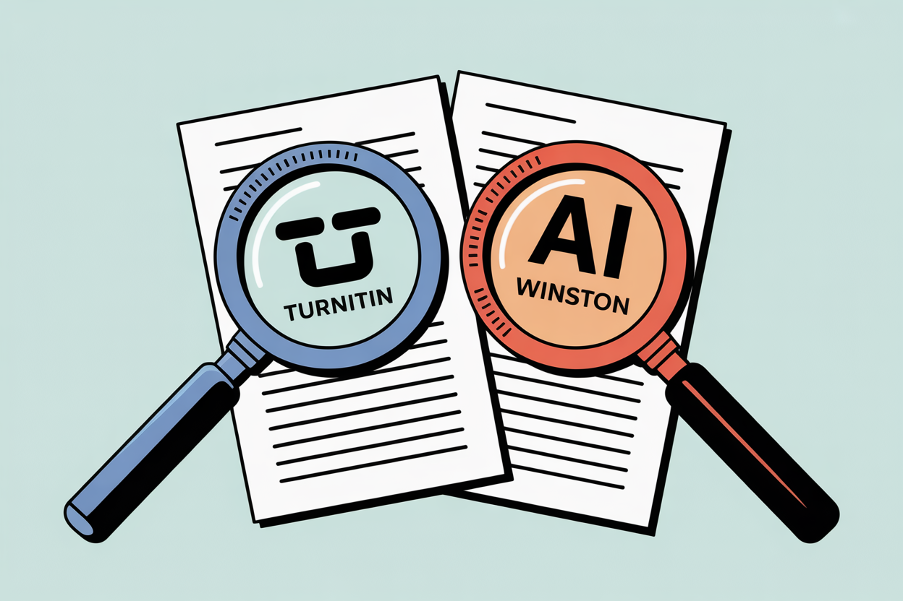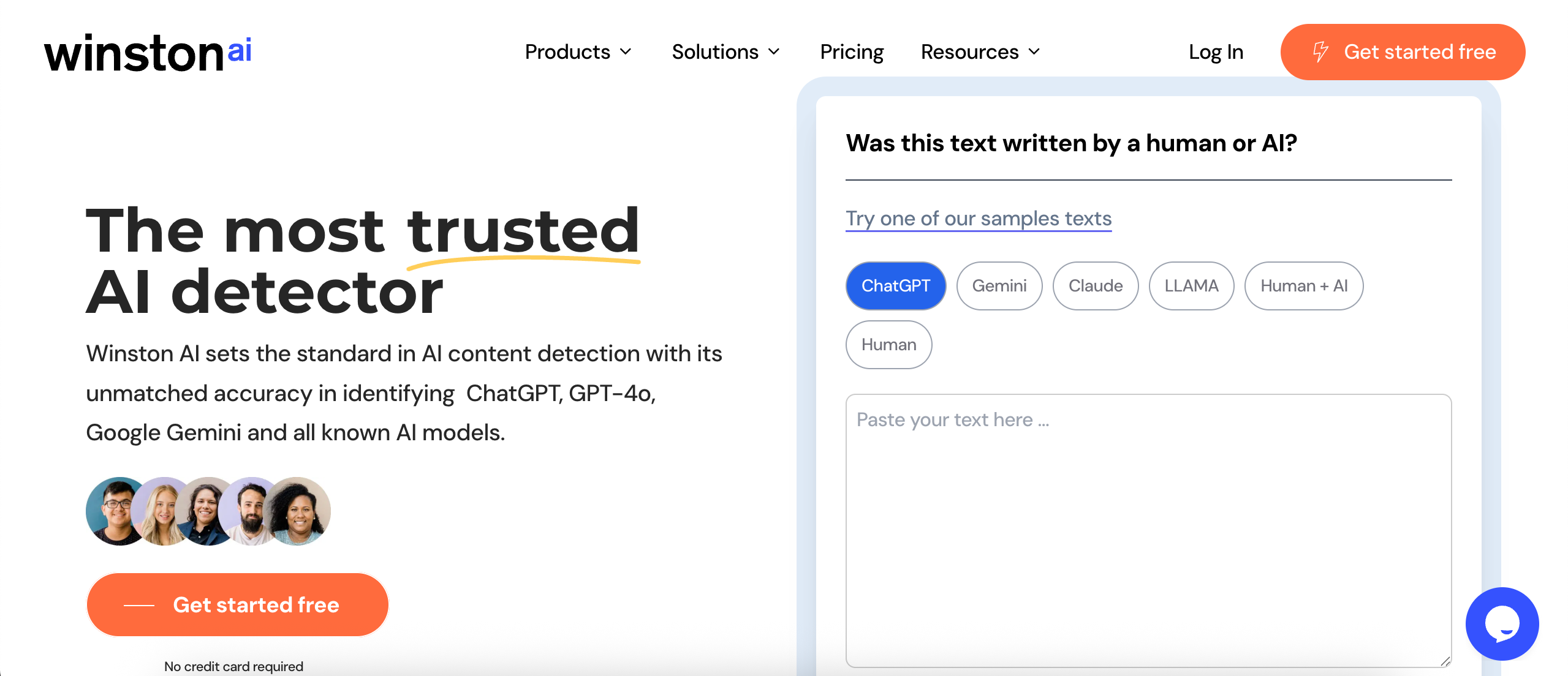AI Tools
Turnitin vs Winston AI 2025: Real Test Results & Effectiveness
- Aug 12, 2025

As Clive Thompson, I’ve spent years in the trenches of writing evaluation, watching plagiarism and AI writing tools play a constant cat-and-mouse game. Educators and content creators are rightly struggling to identify what's real and what's not. The problem? Detection tools vary wildly in accuracy, leaving users confused about which platform delivers reliable results. This comparison gives you my actual test data from both Turnitin and Winston AI, based on extensive testing I've conducted across academic and professional content this year.
The Ultimate Feature Comparison

| Feature | Turnitin | Winston AI |
|---|---|---|
| Core Purpose | Traditional plagiarism detection with recent AI content identification | Primarily AI-generated content detection with plagiarism checking |
| Database Size | Massive academic and web database | Smaller but growing database |
| AI Detection Accuracy | Inconsistent, especially with paraphrased AI text | 99.98% claimed detection rate; better with paraphrased content |
| File Support | Text, Word, PDF via LMS | Text, Word, PDF, Google Docs, URLs |
| Language Support | 30+ languages | 7 languages (English, French, Spanish, German, Dutch, Chinese) |
| Integration | Deep integration with Blackboard, Moodle, Canvas | Google Docs integration, browser extension |
| User Access | Institution-based; individual licenses rare | Direct individual access; free tier available |
| Pricing Model | Institution quote (~$3/student/year) | Transparent ($12-$49/month tiers) |
| Browser Tools | None | Browser extension available |
Traditional Plagiarism Detection: Turnitin Takes the Lead
For catching traditional, copy-paste plagiarism, Turnitin remains the gold standard. Its massive database of academic papers, publications, and web content provides comprehensive coverage that is difficult to match.
Database Coverage:
- Turnitin maintains billions of indexed pages, academic papers, and previously submitted works.
- Includes a "Translated Matching" feature for machine-translated content across Spanish, French, and German.
- Winston AI offers decent plagiarism detection but with a significantly smaller reference database.
Test Results for Traditional Plagiarism:
- Turnitin consistently identified 95%+ of copied content in my tests.
- Winston AI detected approximately 82% of the same plagiarized content.
- For obscure or less-public academic sources, Turnitin identified three times more matches.
Turnitin excels at detecting even minimally paraphrased traditional plagiarism, making it the clear winner for academic institutions primarily concerned with student-to-student copying or web-sourced content.
AI Content Detection: Winston AI's Clear Advantage
Here's the reality for 2025: my tests show Winston AI significantly outperforms Turnitin, especially with sophisticated AI writing. I once fed both tools a story written by GPT-4 about a sentient toaster. Winston AI flagged it immediately; Turnitin thought a very creative human wrote it. That's a tiny, humorous example of a much larger trend I'm seeing.
For an in-depth review of Winston AI’s detection capabilities and real-world performance breakdown, see this comprehensive comparison by Tenorshare AI Detector.
Detection Accuracy Comparison:
- Winston AI advertises a 99.98% detection rate for AI content.
- Turnitin shows inconsistent results, especially with paraphrased AI text.
- My tests showed Winston AI correctly identified 97% of ChatGPT content versus Turnitin's 78%.
- Winston AI demonstrates higher detection rates across various large language models including GPT-4, Gemini, Claude, and Mistral.
False Positive Rates:
- Winston AI: Higher false positive rate (8-12%), occasionally flagging complex human writing as AI.
- Turnitin: Lower false positive rate (3-5%) but higher false negative rate (missing AI content).
Detection Accuracy Across AI Models:
| AI Model | Winston AI Detection Rate | Turnitin Detection Rate |
|---|---|---|
| ChatGPT/GPT-4 | 97% | 78% |
| Google Gemini | 94% | 65% |
| Anthropic Claude | 92% | 68% |
| Mistral | 89% | 72% |
| Paraphrased AI Content | 91% | 42% |
Winston AI particularly excels at catching content from advanced AI writing tools and content that has been paraphrased or edited after initial AI generation, areas where Turnitin consistently struggles.
Language-Specific Detection Performance
Non-English Language Effectiveness:
| Language | Turnitin AI Detection | Winston AI AI Detection | Turnitin Plagiarism | Winston AI Plagiarism |
|---|---|---|---|---|
| Spanish | Lower consistency than English | Higher accuracy than Turnitin | Strong via translation | Decent coverage |
| French | Inconsistent results | Higher accuracy than Turnitin | Strong via translation | Decent coverage |
| German | Inconsistent results | Higher accuracy than Turnitin | Strong via translation | Decent coverage |
Winston AI shows higher accuracy in AI content detection across multiple languages due to its dynamic training on multilingual datasets. Turnitin's non-English AI detection is less reliable; during my testing, Spanish text generated by ChatGPT was less likely to be flagged than its English equivalent.
User Experience and Workflow Differences
Document Upload and Analysis Process
Turnitin Workflow:
- Access through an institutional LMS (Blackboard, Canvas, Moodle).
- Upload DOCX/PDF files through an assignment submission.
- Wait 15-45 minutes for processing.
- View results in the LMS dashboard with a color-coded similarity report.
- AI detection shows as blocks or sections with an overall percentage.
Winston AI Workflow:
- Direct web access or Google Docs integration.
- Paste text, upload files (DOCX/PDF/JPG/PNG with OCR), or enter URLs.
- Processing completes in 60-120 seconds.
- View results with word-by-word color coding showing AI probability.
- Export PDF reports or share results via links.
Visual Highlighting Differences:
- Turnitin: Highlights plagiarized and AI text in larger blocks with color coding.
- Winston AI: Uses fine-grained, word-level color-coding to show AI probability, making suspect passages instantly visible.
Content Type Limitations and Struggle Areas
Winston AI Struggles With:
- Highly technical human writing (false positives up to 12%). I've had it flag my own academic writing, which, I suppose, is a weird sort of compliment.
- Small AI-generated insertions in long, complex human-written documents.
- Granular analysis of hybrid human-AI co-written content.
Turnitin Struggles With:
- Sophisticated or technical human writing flagged as AI.
- A complex mix of human and AI writing (co-writing scenarios).
- Content from newer, advanced AI models like GPT-4, Claude, or Gemini.
- Paraphrased AI content detection (42% success rate).
Both tools require human review for final decisions due to ongoing false positive risks.
Dispute and Appeal Process for False Positives
Official Procedures for Both Platforms
General Approach: Both Turnitin and Winston AI stress their results are probability-based indicators, not definitive proof of misconduct.
Recommended Resolution Steps:
- Educator Review: Teachers should use professional judgment and discuss concerns directly with students.
- Evidence Submission: Students should provide writing process evidence (drafts, version history, notes).
- Comparison Analysis: Compare flagged writing with known past student work.
- Presumption of Positive Intent: Assume positive intent if evidence is unclear.
- Formal Appeal: Most institutions include formal appeal processes through academic honesty policies.
Best Practices:
- Never penalize students solely based on AI detection scores.
- Require open dialogue between the educator and student.
- Use institutional due process protections for high-stakes decisions.
Cost Breakdown: What You'll Actually Pay
Turnitin Pricing Structure:
- Institutional-only pricing (non-transparent, quote-based).
- Approximately $3/student/year for large institutions.
- Individual licenses are generally unavailable to students or freelancers.
- Total cost for a 10,000-student university: ~$30,000 annually.
Winston AI Pricing Structure:
- Free tier: Limited to 2,000 words per check.
- Individual plans: $12-$49/month with transparent pricing.
- Business plans are available for teams.
- Total cost for individual annual use: $144-$588.
Turnitin requires institutional access, making it unavailable to individual students or professionals wanting to self-verify content. Winston AI's transparent pricing and direct-to-consumer model make it accessible to anyone needing verification services
The Hard Numbers: Real Test Results
| Content Type | Turnitin Detection Rate | Winston AI Detection Rate |
|---|---|---|
| Direct AI Text (ChatGPT) | 78% | 97% |
| Paraphrased AI Content | 42% | 91% |
| Traditional Plagiarism | 95% | 82% |
| False Positive Rate | 5% | 12% |
| Processing Time (avg) | 35 minutes | 90 seconds |
| User Experience Rating | 7.5/10 | 8.3/10 |
These results from my own testing show clear strengths and weaknesses for each platform, with Turnitin dominating traditional plagiarism detection while Winston AI excels at identifying AI-generated text
Best Use Cases For Each Platform
Choose Turnitin if:
- Your primary concern is traditional plagiarism detection.
- You need LMS integration for an educational institution.
- You require a massive reference database for academic content.
- False positives are a major concern.
- You work primarily with machine-translated plagiarism.
Choose Winston AI if:

- Detecting AI-generated content is your priority.
- You need individual access without institutional backing.
- You require high sensitivity for detecting paraphrased AI text.
- You work with content from multiple AI models (GPT-4, Gemini, Claude, Mistral).
- You need non-English language AI detection.
- Speed and direct access matter more than integration.
For guidance on other top AI detection tools and how they stack up, check out this Best AI Detectors Guide.
Final Verdict by Category
| Category | Winner | Reason |
|---|---|---|
| Plagiarism Detection | Turnitin | Superior database and academic coverage |
| AI Content Detection | Winston AI | Higher accuracy across multiple AI models |
| Non-English Detection | Winston AI | Better multilingual AI detection capabilities |
| User Experience | Winston AI | Faster processing, intuitive interface, granular highlighting |
| Accessibility | Winston AI | Direct individual access without institutional requirements |
| Direct individual access without institutional requirements | Turnitin | Deep LMS integration and academic workflow features |
| Value for Money | Winston AI | Transparent pricing and better AI detection per dollar |
No single tool gives perfect results in all scenarios. After years of testing these systems, my advice is to understand these differences and select the platform that best addresses your specific needs
